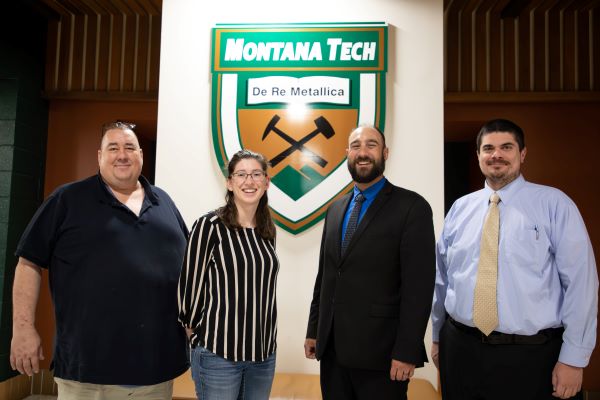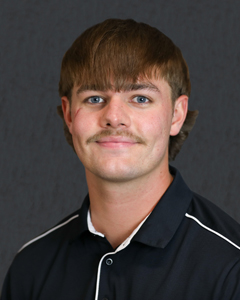Campus leaders say overcoming failure, imposter syndrome critical to success
Final grades are due Dec. 13, and it can be stressful. Failing a class or making a lower grade than expected can deal a blow to one’s progress and one’s ego. Seasoned academics and leaders from around campus weighed in on their experiences with failure and imposter syndrome.
Emily Maynard

Emily Maynard is a first-year graduate student pursuing a master’s degree in Materials Science and Engineering. She’s a member of Dr. Peter Lucon’s Montana Tech Advanced Materials research group and is conducting research for the U.S. Navy.
Her fully-funded project focuses on improving the 3D printing process. As 3D printing continues to proliferate, engineers still have to work to perfect the process.
“The bonding between the layers isn’t as great as the bonding is between a molded piece,” Maynard notes. “We’re trying to combine a laser with the 3D printer to make it stronger.”
Maynard says she dreamed of being an engineer since the fourth grade. That vision became a reality when she graduated from Montana Tech with a B.S. in Mechanical Engineering in 2021. She worked in industry for two years before pursuing her master’s degree.
“I never thought I would get my master’s degree,” Maynard said. “I am the fourth child out of six and I was the first one to graduate high school, and the only one to graduate college so far. Getting my master’s degree feels like such a big goal.”
But those dreams could have easily been derailed if she had given up when she encountered failure early in her college career. In freshman year she was working 40-hour weeks, and taking a huge load of classes. She failed a class and felt terrible about it.
Instead of quitting, Maynard cut back on her work hours to focus on school, and doubled down on academics.
“Failing is ok,” Maynard said. “Failing is not the end. If you are going to eventually succeed, you will have failures.”
Maynard said the key is to never give up.
“You can do anything you put your mind to,” Maynard said.
Jacob Huston

ASMT Senate President Jacob Huston attended a Leadershape Conference in Boston over the summer. He said the biggest takeaway from that event was to normalize failure and overcome it rather than fixating on it in unhealthy ways.
Huston is a biochemistry senior from Havre, in the process of applying to pharmacy school. In addition to serving in student government, Huston has performed undergraduate research, and enjoys spending time outdoors with friends and family.
Managing all of those activities can be a challenge, and has, at times, included failure.
“Don’t be afraid to fail,” Huston said. “College gives you a run for your money. Learning to accept your first failure will be huge. You have to learn that first failure doesn’t define you.”
Dr. Richard LaDouceur, Assistant Professor of Mechanical Engineering

In a panel discussion with other first-generation campus leaders, Assistant Professor of Mechanical Engineering Dr. Richard LaDouceur told students how his journey as a student included dropping out after one semester at the University of Nevada- Las Vegas.
“I went and had a life outside of academics,” LaDouceur said. “I moved back to Butte just before I turned 30, and I was lucky that my family situation, my life situation made it so that I could go back to school.”
LaDouceur received his undergraduate and Ph.D. degrees from Montana Tech. He found a passion for research and turned it into a career.
LaDouceur told the audience that he wishes there was more awareness about imposter syndrome on campus.
“Most students experience imposter syndrome while they are going through classes,” LaDouceur said. “You don’t know (the material) because you are here learning it, so of course you are going to feel like you don’t know it. Every student is experiencing this sort of feeling that they don’t belong here.”
That couldn’t be further from the truth.
“You are here because you deserve to be here. Your effort put you here. Your ability put you here,” LaDouceur said.
Resources available
Students experiencing stress might want to consider signing up for Mantra Health, the University’s online telehealth provider that students can access in just a few easy steps. They offer a number of services ranging from wellness coaching to clinical counseling and 24/7 crisis care.
More than 100 Orediggers have utilized Mantra Health so far. To access Mantra Health click here. Students must use their @mtech.edu email address and will be asked to complete a short onboarding questionnaire.
Students struggling academically can reach out to the Academic Center for Excellence for more resources. ACE offers peer tutoring, academic coaching and mentoring to all students at Montana Tech. In addition, students can meet with staff members one-on-one or attend workshops in advising, disability support services, and student success to learn more about how to set themselves up for success. To learn more, click here.